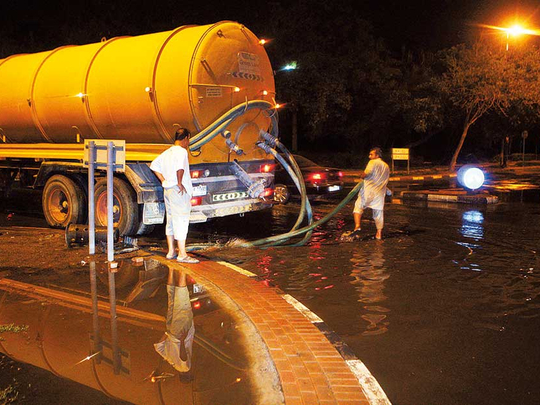
Dubai: The UAE has some of the most efficient freshwater infrastructure networks among Gulf countries to guard against costly leaks, according to a new white paper by global consulting firm Frost & Sullivan.
Stopping leaks from underground water mains that feed homes, commerce and industry, curbs precious desalinated water from being lost into the ground and reduces the need to compensate by producing higher volumes of potable water.
The paper, “Soaring Demand for Water in the Middle East”, pointed out that Dubai Electricity and Water Authority (Dewa) has substantially reduced its own water leaks by more than 75 per cent since the late 1980s.
“A recent report from the Dubai Electricity and Water Authority (Dewa) presents lowest ever water loss rate at 8.26 per cent. Dewa earlier managed to decrease water network losses from 42 per cent in 1988 to 10.4 per cent in 2013, due to this becoming a priority for the Dewa management,” stated authors.
The utility’s work is in keeping with the Dubai Integrated Energy Strategy (Dies) 2030 which aims to slash water use by 40 per cent by 2030.
“It is known that the UAE has always been on the forefront of water management in the GCC, while other countries follow suit. With focus shifting to curbing water losses and improving efficiency, leak detection technologies are expected to provide the cure.”
The UAE is faring better at stopping the leaks than most of its GCC neighbours, according to United Nations figures, the report noted.
Unaccounted for water in Saudi Arabia is estimated as high as 20 to 40 per cent, Oman and Bahrain are reporting up to 30 per cent. Qatar is around 19.6 per cent while Kuwait is somewhere between one per cent and 13 per cent.
“However, all the countries in the GCC have realised the implication of water loss in distribution networks and have made progress in bringing these numbers down,” noted Frost & Sullivan.
Clamping leaks is critical to cut down on water consumption in countries where it is already much higher than elsewhere on the planet.
“The nations in the Gulf consume an average of roughly 816 cubic metres of water per person per year. This is 65 per cent more than the world average,” states the report.
“Water damages frequently occur when leaks are undetected over an extended period. Utilities and water authorities have built a number of water treatment plants but leakages at current levels hinder not just the supply but are also responsible for loss in water revenues, which otherwise would help utilities become revenue-neutral and in due course, profitable,” the report stated.
How to fix a leak
Critical leaks are not easy to see and usually take place in underground pipes.
“Leaks or chances of leaks depend on the age and the overall condition of the network. How well the pressure is managed in the networks is also an important factor,” the Frost & Sullivan paper says.
“The most commonly used method involves acoustic equipment which ‘listens’ to the noise originating from two points and collates information through a leak noise correlator method. In recent years, innovations using high resolution acoustics, surface sensor array to detect and optimise leak sounds have been developed.”












